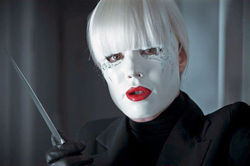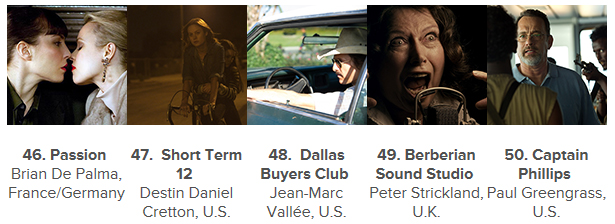WITH QUOTES FROM COSTUME DESIGNER KAREN MULLER-SERREAU
 Christopher Cole has written a terrifically insightful piece at Clothes On Film about the clothes in Brian De Palma's Passion, with details and quotes from the film's costume designer, Karen Muller-Serreau. Cole is particularly interested in the power dynamics at play in the film. "Ice-blonde Christine is a Grace Kelly lookalike who craves attention," Cole states, "usually wearing the most noticeable colour in the room; the solid colours help her stand out without patterns to get in the way."
Christopher Cole has written a terrifically insightful piece at Clothes On Film about the clothes in Brian De Palma's Passion, with details and quotes from the film's costume designer, Karen Muller-Serreau. Cole is particularly interested in the power dynamics at play in the film. "Ice-blonde Christine is a Grace Kelly lookalike who craves attention," Cole states, "usually wearing the most noticeable colour in the room; the solid colours help her stand out without patterns to get in the way."Here's an excerpt from the article:
Muller-Serreau says she wanted to give Rachel a “contemporary Hitchcockian feeling with shapes that have a modern vintage style in bold colours.” Christine begins the film in an ice-blue shirt and palazzo pants combo topped off by a blueberry-vanilla coloured scarf tied artfully around her neck, while Isabelle’s black dress shirt and pants pop against the white walls and light-coloured furniture of Christine’s house. She has to be dominant so she gives the scarf as a gift to Isabelle, wrapping the blueberry-vanilla scarf around Isabelle’s neck; it stands out against her black coat.The following morning, Christine struts her stuff down the path in her front yard in a double-breasted blood-red overcoat that would scare the bejeezus out of Tippi Hedren in Hitchcock’s Marnie (1964); Christine looks like a spoilt little rich girl about to be chauffeured to private school. If Christine sometimes looks like a child playing dress-up, there’s a scene late in the film where she wears a striking black overcoat worn with a wide-brimmed hat, round sunglasses and teal stiletto sandals. It’s a coat that Muller-Serreau wanted to look like a little girl’s coat, so she based it on a classic child’s coat since Christine’s twin sister died in childhood.
Isabelle, the second-in-command, wears black for most of the film signalling her lack of identity. Since Muller-Serreau didn’t have colour to work with for Isabelle, she gave her shape and texture. There’s a suit jacket with heavy shoulder pads that hint at Joan Crawford in Mildred Pierce (1945) and a side-breasted military jacket she wears when she has the upper hand. Her Edith Head hairstyle, fringe and all, helps make her look like she stepped out of an old movie.
One particularly inspiring moment is when an angry, depressed Isabelle at an office reception wears a black dress shirt and pants with a black tie. Underneath the slightly sheer shirt is a black bra. She’s dressed in a stereotypical male outfit, but despite the butch quality of the outfit, she still wants to be desired sexually as a feminine woman. Muller-Serreau says Isabelle’s look was supposed to be a “uniform”, presenting Isabelle as a “soldier” — a soldier who wants to be seen as a sexy woman.
While Isabelle wears only one colour, her assistant Dani wears many colors, and is the only person who threatens Christine’s status as the most colourful person in the room. She often wears animal prints and sometimes pairs it with clashing horizontal stripes. Her costumes are meant to garner attention, like the denim daisy dukes she wears paired with tights and knee-high stiletto boots, and an asymmetrically zipped purple leather motorcycle jacket. However, she also achieves elegance in a violet lace shirt. It’s a look Muller Serreau describes as “feminine and sexy” and that it’s a departure from the “butch lesbian cliché.”
Dirk wears braces with his pinstripe suits and checkered suits; the braces hark back to a much earlier era. His costumes consist of all suits, except for when he wears a tank top in his bedroom post-coital. Lying on a bed, his thin frame is more evident here, making him appear more vulnerable. He confesses secrets while smoking in a cigarette, becoming more feminine in his gestures and voice: he seems to be imitating Christine when he tells Isabelle that the blueberry-vanilla scarf looks better on her. It’s a perfect example of how men are emasculated in this film, and how the characters are much different in private.





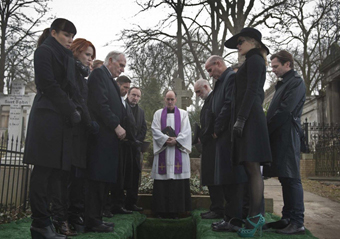 Brian De Palma's Passion has made yet another list of the best films of 2013, this one from a "ragtag band of scattered cinephiles" that strives to "recognize noteworthy achievements from the previous year in cinema, unswayed by awards-season hype." Together, they vote for the
Brian De Palma's Passion has made yet another list of the best films of 2013, this one from a "ragtag band of scattered cinephiles" that strives to "recognize noteworthy achievements from the previous year in cinema, unswayed by awards-season hype." Together, they vote for the 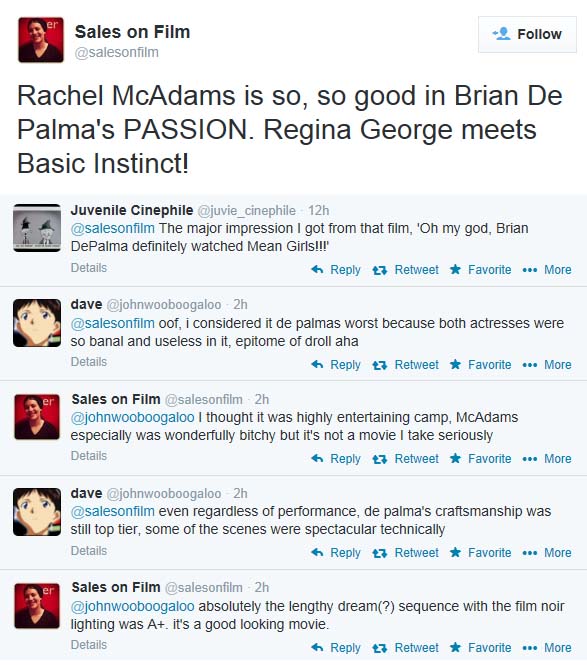
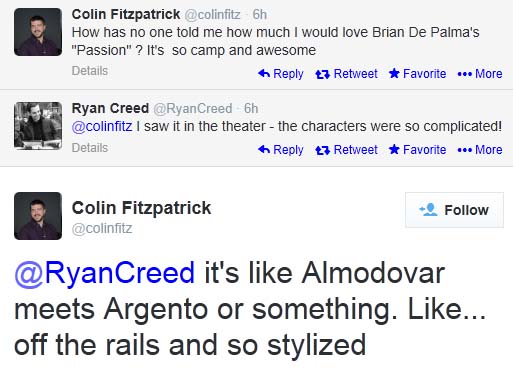

 Brian De Palma's Passion will be included as part of a film series at the
Brian De Palma's Passion will be included as part of a film series at the 